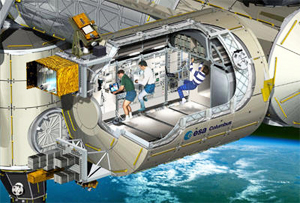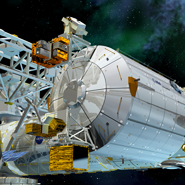Posted: 07 February 2008
UCD researchers assist European Space Agency with plans for use of Columbus laboratory
The European Space Agency’s largest single contribution to the International Space Station, the Columbus laboratory has been launched (07 February 2008) into orbit on board Space Shuttle Atlantis to dock with the International Space Station.
With a 10 year projected lifespan, the 4.5-metre diameter cylindrical module, equipped with flexible research facilities, will enable earth-based researchers, together with the International Space Station crew, to conduct thousands of scientific experiments in the weightlessness of orbit.

Artists impression of the Columbus laboratory. (Courtesy of ESA, D. Ducros)
A group of UCD researchers, led by Dr David Browne from the UCD School of Electric, Electronic and Mechanical Engineering are at the forefront of coordinating and driving initiatives which the ESA is planning for the future use of this laboratory.
“With these incredible experimental facilities available, we can become much more ambitious with our research,” says Dr Browne. The UCD team is actively supporting ground based research which will lead to new near zero-gravity experiments on Columbus.
“Ireland may still be some way from producing its first astronaut, but we are developing the scientific ideas which will keep European ISS astronauts busy in years to come, hopefully inspiring Irish children to become space-bound.”
ESA funding for Irish space-related R&D is managed by Enterprise Ireland
The UCD Phase Transformation Group is led by Professor David J Browne, and its Microgravity Project Manager is Dr Shaun Mc Fadden. Their prime interests are in the effects of gravity on the solidification of novel alloys, and have been involved in developing computational models of solidification, in design of space experiments, and in analysis of the results.
The UCD team has been involved in the design of one sounding rocket microgravity experiment which flew successfully. They were the first to accurately model the behaviour of the experiment, and their results were presented at a recent space science conference in Japan. A second sounding rocket experiment, involving solidification of a new breed of lightweight aerospace alloys known as intermetallics, has just been given the green light by ESA, and UCD is now actively engaged in detailed design of the solidification hardware and experimental protocol.

